30-Day Study Plan for Psychology Class 11 | Psychology Class 11 - Humanities/Arts PDF Download
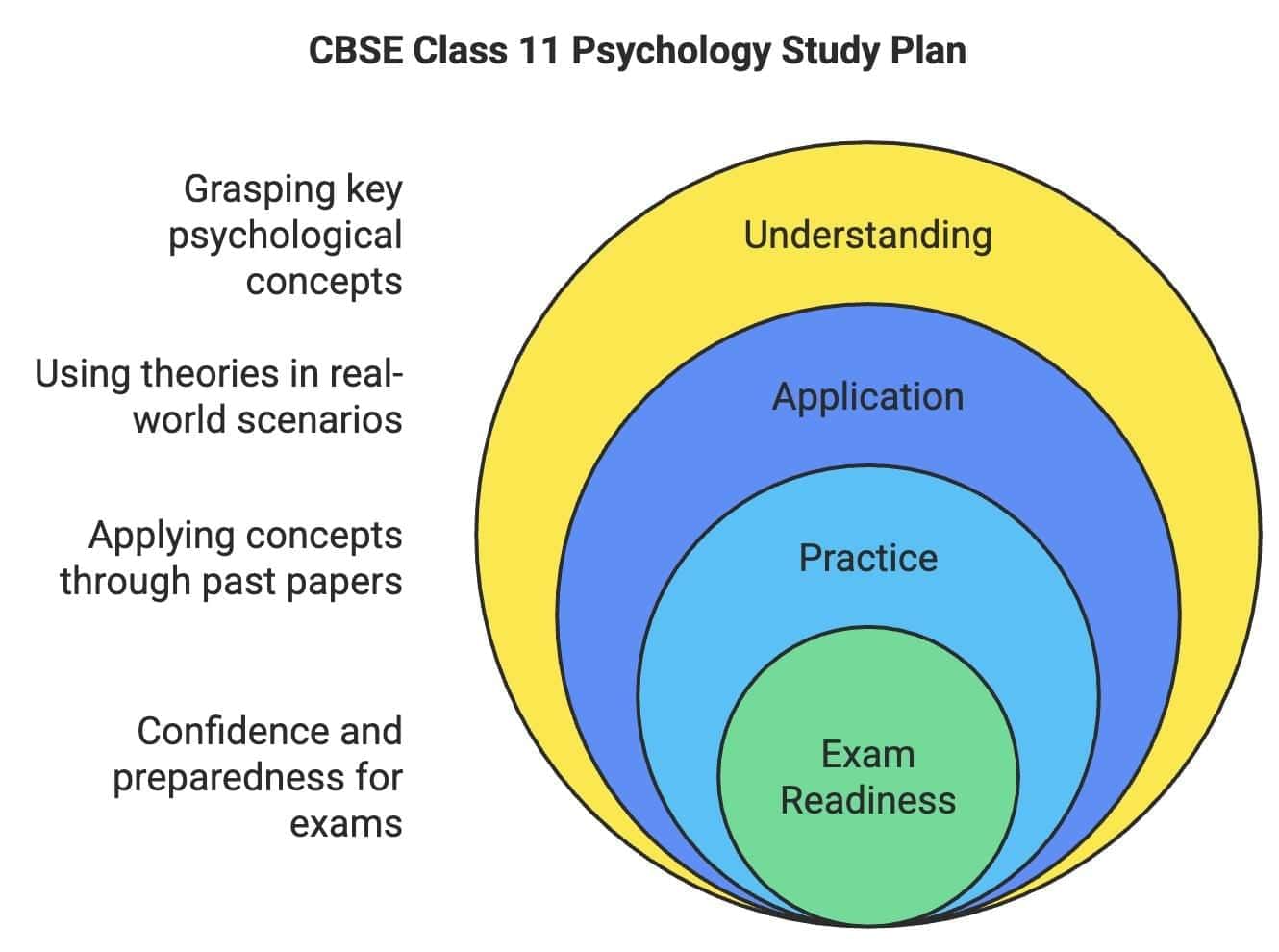
Week 1: Foundational Concepts and Research Methods
Day 1: What is Psychology?
Understand the definition, scope, and branches of psychology. Explore its evolution and relationship with other disciplines.
- Read: NCERT Textbook - What is Psychology
- Study: Revision Notes - What is Psychology and Branches of Psychology
- Practice: Test: Psychology - 1
Day 2: Development and Applications of Psychology
Study the development of psychology in India, popular notions, and themes of research and applications.
- Read: Development of Psychology in India and Themes of Research and Applications - 1
- Study: Basic Vs Applied Psychology
- Practice: Important Questions & Answers: What is Psychology
Day 3: Methods of Enquiry in Psychology - Part 1
Learn about observation, experimental, and survey methods. Understand their applications and limitations.
- Read: NCERT Textbook - Methods of Enquiry in Psychology
- Study: Observation Method and Experimental Method
- Practice: Test: Methods of Enquiry in Psychology - 1
Day 4: Methods of Enquiry in Psychology - Part 2
Explore survey research, field vs. quasi-experiments, and analysis of psychological data.
- Study: Survey Research Method and Field Vs Quasi Experiment
- Study: Analysis of Psychological Data
- Practice: Test: Methods of Enquiry in Psychology - 2
Day 5: Human Development - Part 1
Understand the concept of human development and factors affecting it. Study developmental stages.
- Read: NCERT Textbook - Human Development
- Study: Introduction: Human Development and Factors affecting Development
- Practice: Test: Human Development - 1
Day 6: Human Development - Part 2
Focus on developmental stages and adulthood. Review key concepts using mind maps.
- Study: Developmental Stages and Detailed: Adulthood
- Revise: Mind Map: Human Development
- Practice: Important Questions & Answers: Human Development
Day 7: Revision and Practice
Revise Chapters 1 and 2 using flashcards and worksheets. Solve passage-based questions.
- Revise: Flashcards: What is Psychology and Flashcards: Methods of Enquiry in Psychology
- Practice: Passage Based Questions: What is Psychology
- Practice: Worksheet: Methods of Enquiry in Psychology
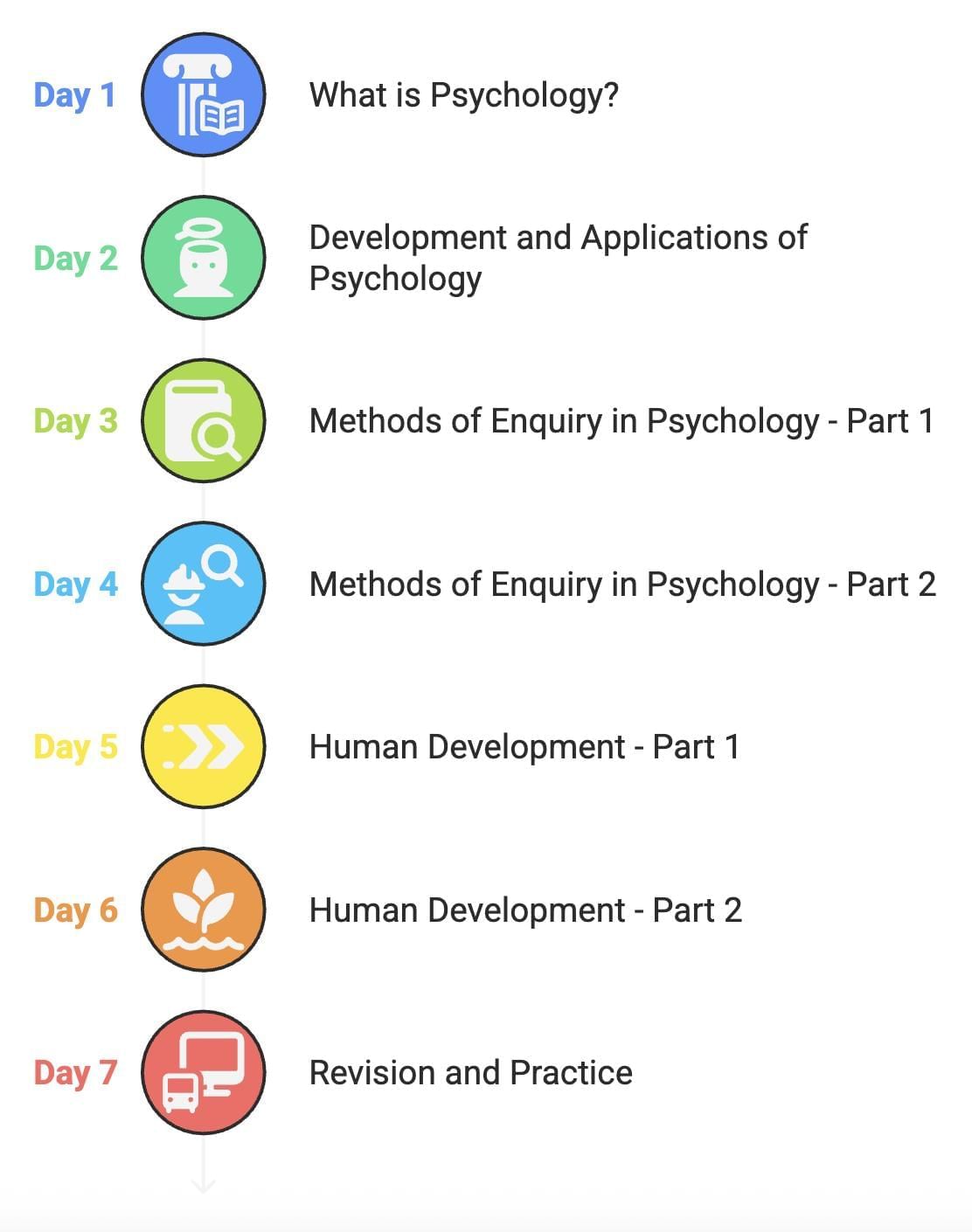
Week 2: Sensory, Perceptual Processes, and Learning
Day 8: Sensory, Attentional, and Perceptual Processes - Part 1
Learn about sensory processes, the human eye, and attentional processes.
- Read: NCERT Textbook - Sensory, Attentional and Perceptual Processes
- Study: Human Eye and Attentional Processes
- Practice: Test: Sensory, Attentional, and Perceptual Processes - 1
Day 9: Sensory, Attentional, and Perceptual Processes - Part 2
Study perceptual constancies, perception of space, depth, and distance, and adaptation.
- Study: Perceptual Constancies and Perception of Space, Depth & Distance
- Study: Detailed: Adaptation
- Practice: Test: Sensory, Attentional, and Perceptual Processes - 2
Day 10: Learning - Part 1
Understand the concept of learning, classical conditioning, and its determinants.
- Read: NCERT Textbook - Learning
- Study: Introduction: Learning and Determinants of Classical Conditioning
- Practice: Test: Learning - 1
Day 11: Learning - Part 2
Explore operant conditioning and compare it with classical conditioning.
- Study: Operant/Instrumental Conditioning and Classical Vs Operant Conditioning
- Revise: Mind Map: Learning
- Practice: Test: Learning - 2
Day 12: Human Memory - Part 1
Study the information processing model and control processes in memory.
- Read: NCERT Textbook - Human Memory
- Study: Information processing Model and Control Processes
- Practice: Test: Human Memory - 1
Day 13: Human Memory - Part 2
Learn about levels of processing and knowledge representation in memory.
- Study: Levels of Processing by Craik & Lockhart and Knowledge representation and organisation in memory
- Revise: Mind Map: Human Memory
- Practice: Test: Human Memory - 2
Day 14: Revision and Practice
Revise Chapters 4 and 5 using worksheets and flashcards. Solve passage-based questions for reinforcement.
- Revise: Flashcards: Sensory, Attentional, and Perceptual Processes and Flashcards: Learning
- Practice: Worksheet: Sensory, Attentional, and Perceptual Processes
- Practice: Worksheet: Learning
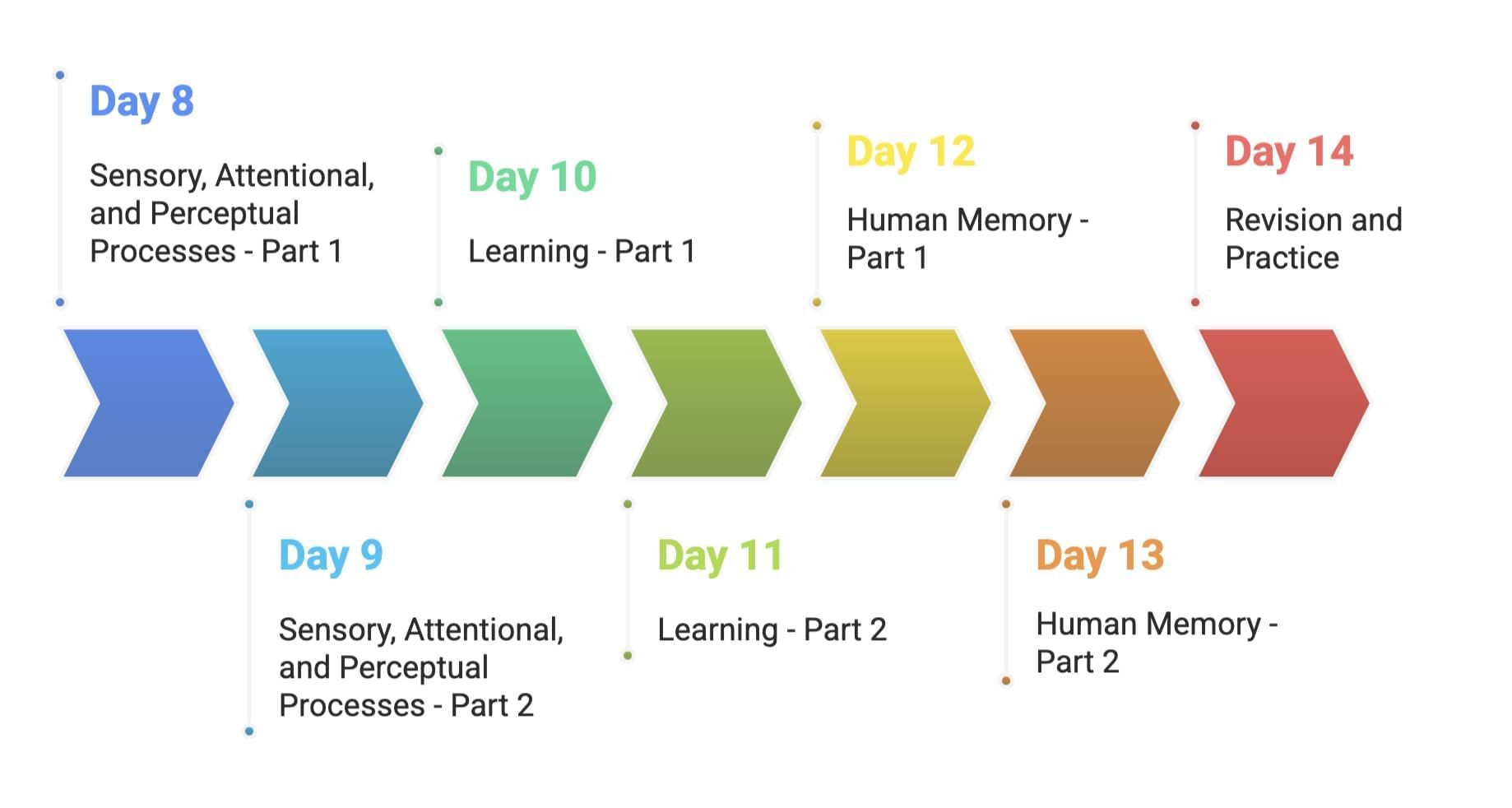
Week 3: Thinking, Motivation, and Emotion
Day 15: Thinking - Part 1
Understand the nature of thinking and the processes involved. Study reasoning and decision-making.
- Read: NCERT Textbook - Thinking
- Study: Introduction: Thinking and The Process of Thinking
- Practice: Test: Thinking - 1
Day 16: Thinking - Part 2
Explore reasoning and decision-making in detail. Use mind maps for quick revision.
- Study: Reasoning & Decision Making
- Revise: Mind Map: Thinking
- Practice: Test: Thinking - 2
Day 17: Motivation and Emotion - Part 1
Learn about motivation, psychosocial motives, and theories of emotion (James-Lange and Cannon-Bard).
- Read: NCERT Textbook - Motivation and Emotion
- Study: Introduction: Motivation & Emotion and James-Lange Theory of Emotion
- Practice: Test: Motivation and Emotion - 1
Day 18: Motivation and Emotion - Part 2
Study frustration, conflict, and cultural influences on emotional expression. Learn strategies for managing emotions.
- Study: Frustration & Conflict and Cultural & Emotional Expression
- Study: Managing Negative Emotions
- Practice: Test: Motivation and Emotion - 2
Day 19: Revision and Practice
Revise Chapters 6 and 7 using worksheets and flashcards. Solve passage-based questions for reinforcement.
- Revise: Flashcards: Human Memory and Flashcards: Thinking
- Practice: Worksheet: Human Memory
- Practice: Worksheet: Thinking
Day 20: Previous Year Papers
Solve previous year papers to understand the exam pattern and question types.
- Practice: Class 11 Psychology Previous Year Paper - 1
- Practice: Class 11 Psychology Previous Year Paper - 2
Day 21: Sample Paper Practice
Practice sample papers to simulate exam conditions and assess your preparation.
- Practice: Sample Question Paper - 1
- Practice: Sample Question Paper - 2
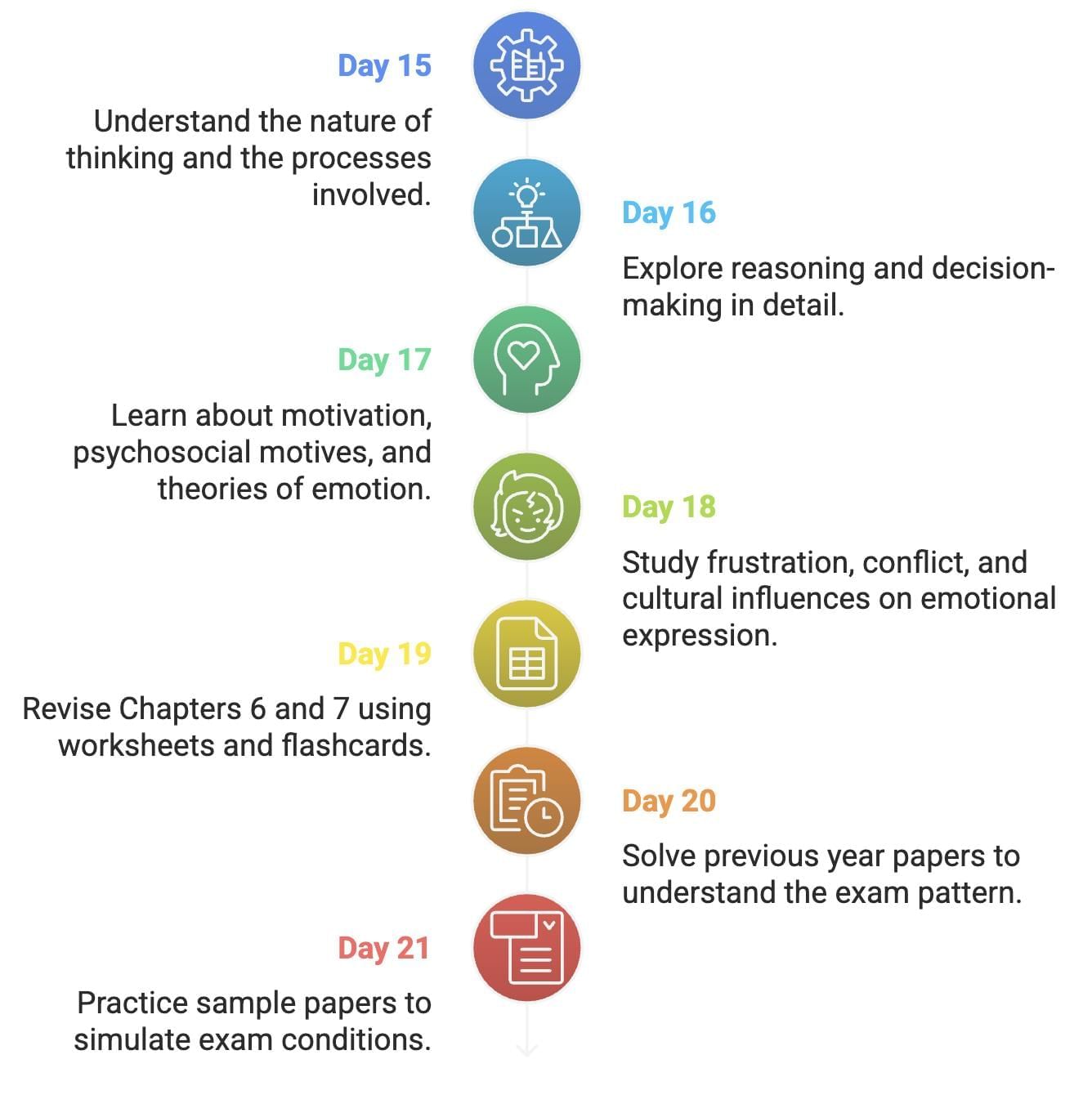
Week 4: Comprehensive Revision and Exam Preparation
Day 22: Revision - What is Psychology and Methods of Enquiry
Review key concepts from Chapters 1 and 2 using mind maps and PPTs.
- Revise: Mind Map: What is Psychology and Mind Map: Methods of Enquiry in Psychology
- Revise: PPT: What is Psychology
- Practice: Test: Psychology - 3
Day 23: Revision - Human Development
Review developmental stages and factors affecting development. Solve important questions.
- Revise: Revision Notes: Human Development
- Practice: Passage Based Questions: Human Development
- Practice: Test: Human Development - 2
Day 24: Revision - Sensory, Attentional, and Perceptual Processes
Revise sensory processes, perception, and attentional mechanisms using flashcards and PPTs.
- Revise: Flashcards: Sensory, Attentional, and Perceptual Processes
- Revise: PPT: Sensory, Attentional, and Perceptual Processes
- Practice: Assignment: Sensory, Attentional, and Perceptual Processes
Day 25: Revision - Learning
Review classical and operant conditioning using cheat sheets and mind maps.
- Revise: Cheat Sheet: Learning and Mind Map: Learning
- Practice: Important Questions & Answers: Learning
Day 26: Revision - Human Memory
Revise memory models and knowledge representation. Solve worksheets for practice.
- Revise: Mind Map: Human Memory
- Practice: Worksheet: Human Memory
- Practice: Assignment: Human Memory
Day 27: Revision - Thinking and Motivation & Emotion
Review thinking processes and motivation theories. Use flashcards for quick recall.
- Revise: Flashcards: Thinking and Flashcards: Motivation and Emotion
- Practice: Important Questions & Answers: Thinking
- Practice: Important Questions & Answers: Motivation & Emotion
Day 28: Full-Length Mock Test
Take a full-length mock test covering all chapters to simulate exam conditions.
- Practice: Sample Question Paper - 3
- Task: Time yourself (3 hours) and review mistakes.
Day 29: Revise Weak Areas
Focus on revising topics where you faced difficulties in the mock test. Use PPTs and revision notes.
- Revise: PPT: Human Memory and PPT: Learning
- Practice: Class 11 Psychology Previous Year Paper - 3
Day 30: Final Mock Test and Relaxation
Take another full-length mock test. Focus on time management and accuracy. Relax and avoid studying new topics.
- Practice: Sample Question Paper - 4
- Task: Review performance and build confidence for the exam.
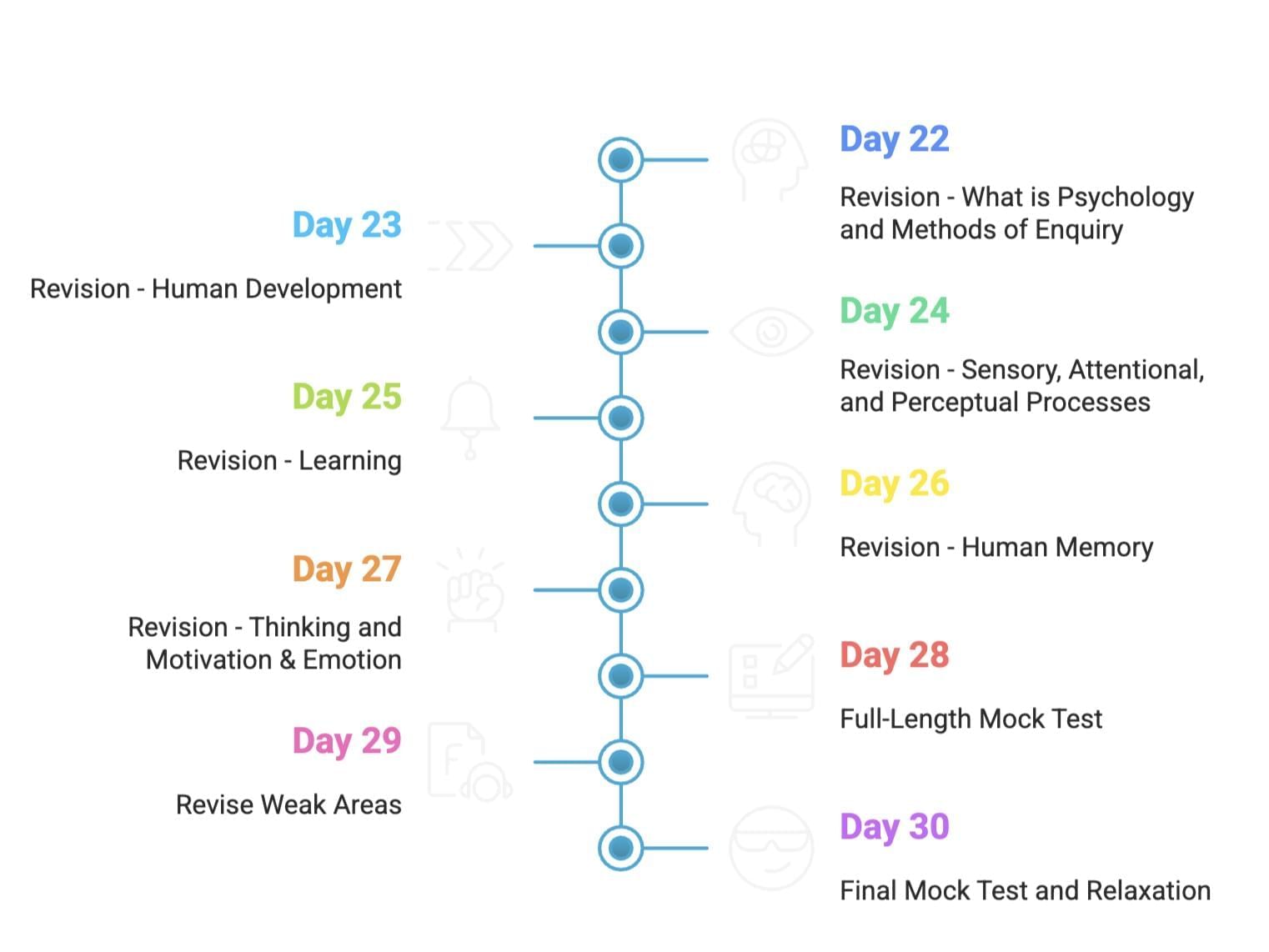
Tips for Success
- Understand Concepts: Focus on understanding theories and processes rather than rote memorisation.
- Use Visual Aids: Leverage mind maps, flashcards, and PPTs for quick revision of key concepts.
- Practice Application: Apply psychological concepts to real-life scenarios to deepen understanding.
- Solve Past Papers: Regularly practice previous year papers to familiarise yourself with question patterns.
- Time Management: Practice completing tests within the allotted time to improve speed and accuracy.
- Revise Regularly: Use revision notes and cheat sheets to reinforce key points before the exam.
- Stay Positive: Take short breaks to avoid burnout and maintain a confident mindset.
|
43 videos|88 docs|18 tests
|
FAQs on 30-Day Study Plan for Psychology Class 11 - Psychology Class 11 - Humanities/Arts
| 1. What are the foundational concepts in psychology that are essential for understanding the subject? |  |
| 2. How do sensory and perceptual processes influence learning? |  |
| 3. What are the main theories of motivation and how do they relate to emotion in psychology? |  |
| 4. What strategies can students use for effective exam preparation in psychology? |  |
| 5. Why is comprehensive revision important before exams in psychology? |  |















